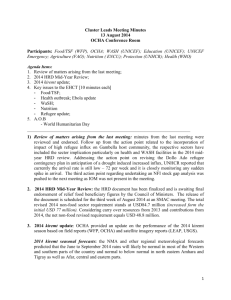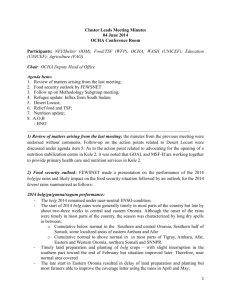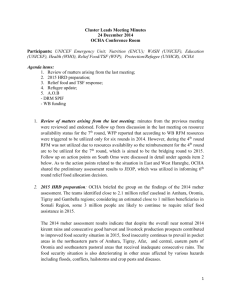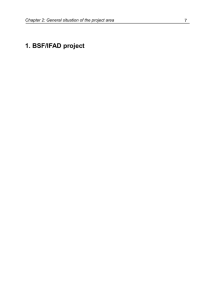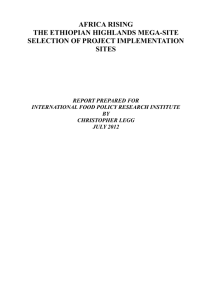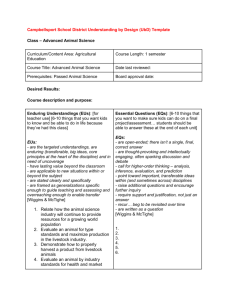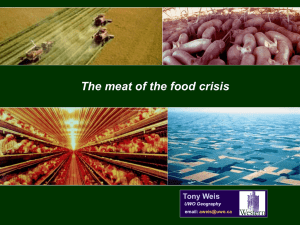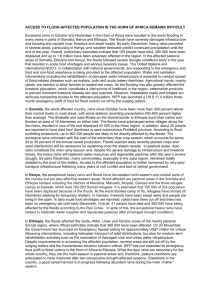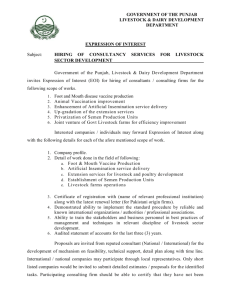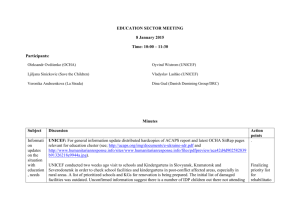090714 Cluster Leads Meeting_Minutes
advertisement
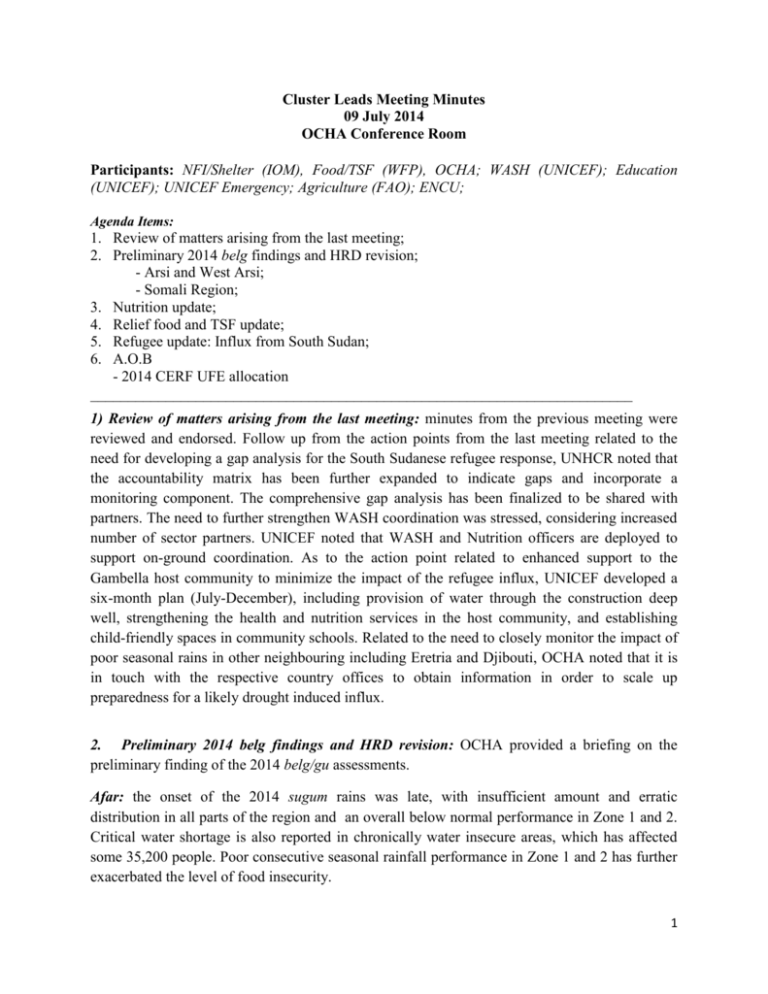
Cluster Leads Meeting Minutes 09 July 2014 OCHA Conference Room Participants: NFI/Shelter (IOM), Food/TSF (WFP), OCHA; WASH (UNICEF); Education (UNICEF); UNICEF Emergency; Agriculture (FAO); ENCU; Agenda Items: 1. Review of matters arising from the last meeting; 2. Preliminary 2014 belg findings and HRD revision; - Arsi and West Arsi; - Somali Region; 3. Nutrition update; 4. Relief food and TSF update; 5. Refugee update: Influx from South Sudan; 6. A.O.B - 2014 CERF UFE allocation ________________________________________________________________________ 1) Review of matters arising from the last meeting: minutes from the previous meeting were reviewed and endorsed. Follow up from the action points from the last meeting related to the need for developing a gap analysis for the South Sudanese refugee response, UNHCR noted that the accountability matrix has been further expanded to indicate gaps and incorporate a monitoring component. The comprehensive gap analysis has been finalized to be shared with partners. The need to further strengthen WASH coordination was stressed, considering increased number of sector partners. UNICEF noted that WASH and Nutrition officers are deployed to support on-ground coordination. As to the action point related to enhanced support to the Gambella host community to minimize the impact of the refugee influx, UNICEF developed a six-month plan (July-December), including provision of water through the construction deep well, strengthening the health and nutrition services in the host community, and establishing child-friendly spaces in community schools. Related to the need to closely monitor the impact of poor seasonal rains in other neighbouring including Eretria and Djibouti, OCHA noted that it is in touch with the respective country offices to obtain information in order to scale up preparedness for a likely drought induced influx. 2. Preliminary 2014 belg findings and HRD revision: OCHA provided a briefing on the preliminary finding of the 2014 belg/gu assessments. Afar: the onset of the 2014 sugum rains was late, with insufficient amount and erratic distribution in all parts of the region and an overall below normal performance in Zone 1 and 2. Critical water shortage is also reported in chronically water insecure areas, which has affected some 35,200 people. Poor consecutive seasonal rainfall performance in Zone 1 and 2 has further exacerbated the level of food insecurity. 1 Amhara: overall, the 2014 belg rain was rated as normal, suitable for both crop and livestock production in most belg producing areas of North Shoa, South Wollo, Oromia and North Wollo zones. Of the total expected 2014 belg crop production (4,402,139 qtl.), the yield estimated is less by 31 per cent as compared to the plan and higher by 49 per cent as compared to the reference year. Also, the contribution of livestock and livestock products for household income is good due to good physical condition of livestock in most areas. However, the prospect of belg crops is not favourable due to farmers’ loss of confidence on the belg season and weather adversities such as moisture deficit, hailstorms and frost in most areas of North Wollo, some areas of South Wollo and North Shoa zones. The assessment team observed some areas that are affected by critical food insecurities in Meket, North Wollo zone. SNNPR: the overall performance of belg rains was normal in most places and crops were at maturing and harvesting stage during the assessment period. Yet, delayed onset, erratic and below normal rains has resulted in an extended lean season and an overall poor condition in pastoral and agro-pastoral areas of South Omo and lowland areas of Segen, Sidama, Gamo Gofa and Wolayta zones. The overall food security situations in most parts of the region is near normal, while pocket areas in Aleta Wendo, Boricha, Dale, Loka Abaya and Shebedino woredas (Sidama zone), in nine woredas in Gamo Gofa and six woredas in Wolayta zones and pastoral and agro-pastoral areas of Dasenech and parts of Bena Tsemay, Gnangatom, Hamer and Male woredas in South Omo zone is much below normal. Tigray: The performance of 2014 belg rainfall was rated as poor. Although the onset was normal in almost all woredas, the overall performance of the rains were reported to be much below average. Acute water shortage remains to be a concern in most belg receiving areas. A total of 47,338 people are seriously affected and some 22,172 are at risk of water supply problem mainly due to drought. The most affected woredas are Raya Azebo and Hintalo Wajirat. Somali: the performance of the 2014 gu rains was poor in most seven gu receiving southern zones. In most zones considerable number of kebeles did not receive rains. Acute water shortages are visible in most areas especially in birkad dependent woredas. Water trucking operations have already started in some kebeles by woreda administrators. Pasture availability is becoming a serious challenge in all the zones even in areas which received some rains due to large concentration of livestock, following large scale abnormal migration, resulting in rapid depletion of available pasture. Currently livestock movement is abnormal within the woredas and to neighboring areas in Kenya and Oromia region. According to the community elders and woreda administrations, the migration is likely to trigger potential sporadic resource based conflict. Oromia: Although the 2014 belg rain in most part of the visited zones commenced early or on time, the amount is rated very minimal with very erratic distribution both spatially and temporally. The situation is worse in six woredas of Arsi, four woredas of West Arsi, four woredas of Bale, ten woredas of Borena, three woredas of Guji, four woredas of East Hararghe, 2 two woredas of North showa and six woredas of West Haraghe. The cessation of the rain is reported early by two to one month from the normal time. The poor performance of the season affected crop and livestock production. In almost all the visited woredas the planted area is much below the plan, particularly in most woredas in Arsi, four woredas of Bale and four woredas of West Arsi, where no harvest is expected. The poor rain performance also affected the availability of pasture and water for livestock as a result there is significant livestock death reported from Arsi and West Arsi while there is unusual livestock migration reported from Borena, East Haraghe, West Haraghe and Bale to perennial rivers. Following reports of deteriorating food security situation in Arsi, with reports of massive livestock death, two emergency coordination meeting were convened by DRMFSS to mobilize an immediate response. A one month ration has been dispatched to 70,000 beneficiaries in Arsi, identified by the DRMFSS rapid assessment team. The figure will be further revised based on the 2014 belg verification assessment findings. UNICEF in collaboration with the Oromia Regional Water Bureau (RWB) has deployed two trucks. Additionally, ETB1.5 million has been transferred to the RWB with which four more tracks could be deployed. UNICEF is also coordinating other WASH sector partners to engage in response to address gaps. DRMFSS in the last coordination meeting urged the need to scale up emergency livestock interventions through provision of feed and commercial de-stocking interventions. FAO reported that a DRMATF meeting is scheduled in the afternoon to discuss commercial de-stocking interventions. FAO is also closely working with the zone to activate a zonal taskforce in Arsi, to coordinate on-ground response. 2014 HRD revision: the 2014 HRD identified 2.7 million relief food beneficiaries and a total of USD 403 million for multi-sector humanitarian requirements. The projection at the beginning of the year was developed based on the assumption that the 2014 April to June pastoral rains will be normal. The actual performance of the rains was, however, poor in most pastoral areas. The requirements are, therefore, to be adjusted based on the 2014 multi-agency belg verification assessment. The methodology subgroup has developed a time frame for the HRD preparation indicated as follows: 1) Sector taskforces to collect assessment reports from DRMFSS - 10-14 July 2014; 2) Sectors taskforces to submit HRD revision inputs – 21 July 2014; and DRMFSS and OCHA compile and prepare the final document - 28 July 2014. Action point: 1) OCHA to share the 2014 belg/gu verification assessment reports with Cluster leads Action point: 2) Cluster leads to closely work with the sector-line ministries to prepare the sector inputs and submit on the agreed deadline; 3. Nutrition update: concerning level of malnutrition are reported amongst the host community in Gambella (Lare – GAM 18.2 per cent and SAM 4.3 per cent; Jikaw – GAM 19.2 per cent and 3.3 per cent). In Amhara, the TFP admission is in the overall stable. High TFP 3 admission is reported in some areas in Oromia including in Arsi, West Arsi and Bale. GOAL has conducted an emergency nutrition survey in Arsi and the results are being finalized. Similarly, increased admission is reported in Somali Region. Furthermore, the nutrition situation is deteriorating in Zone 1 and 2 in Afar and some areas in Southern Tigray. 4. Relief food and TSF update: Relief food: as of July 2014 the 2nd round dispatch stands at 98 per cent and distribution at 68 per cent. The dispatch of the 3rd round has reached 68 per cent, with 3 per cent distribution. RFM resources were utilized for the 3rd round assistance. WFP reported, the 4th round will be fully covered with available relief resources (RFM will not be utilized). It was noted that a meeting scheduled for today – 9 July 2014 at 11:00a.m to clarify of the utilization of RFM to cover HRD needs from 2015 onwards. Meanwhile, TSF resources have been dispatched in Afar and SNNPR. In Oromia, the distribution has been partly done. 5. Refugee update: Influx from South Sudan: as of 8 July, Gambella received 166,889 new asylum seekers who arrived since mid-December 2013. Two of the newly established camps Lietchuor and Kule 1, already reached full capacity and Kule 2 will be full soon. New land is difficult to identify as most areas are flood-prone and not suitable for refugee camps. UNICEF is to undertake a geological survey in Kule 2, where major water problem is reported. 6. A.O.B - 2014 CERF UFE allocation: OCHA informed cluster leads that $12 million has been allocated to Ethiopia through the 2014 CERF UFE. OCHA will convene a follow up meeting to discuss the funding allocation process. 4
